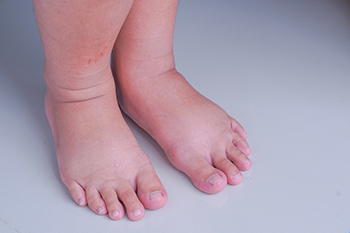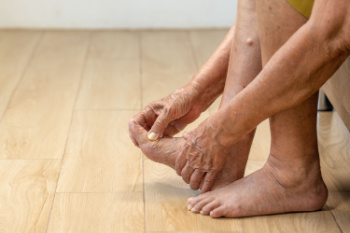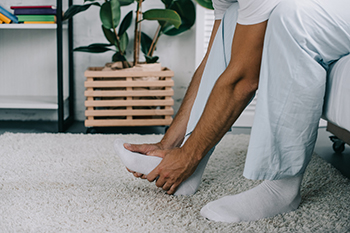Connect With Us
Blog
June 2024

Gout is a form of arthritis characterized by sudden, intense pain, often in the big toe, but it can affect other joints as well. The pain is typically described as sharp, throbbing, or excruciating, making even the lightest touch unbearable. In addition to the pain, affected joints often become swollen, red, and warm to the touch. These symptoms can come on suddenly, often at night, and can last for several days or even weeks. During a gout attack, movement of the affected joint is extremely painful, and the skin around the joint can appear shiny and stretched. Some individuals might also experience a lingering discomfort even after the severe pain subsides, along with decreased mobility in the joint. Chronic gout can lead to persistent pain and can cause damage to the joints over time. If you have pain in your big toe, it is strongly suggested that you consult a podiatrist.
Gout is a foot condition that requires certain treatment and care. If you are seeking treatment, contact Cary Golub, DPM from New York. Our doctor will treat your foot and ankle needs.
What Is Gout?
Gout is a type of arthritis caused by a buildup of uric acid in the bloodstream. It often develops in the foot, especially the big toe area, although it can manifest in other parts of the body as well. Gout can make walking and standing very painful and is especially common in diabetics and the obese.
People typically get gout because of a poor diet. Genetic predisposition is also a factor. The children of parents who have had gout frequently have a chance of developing it themselves.
Gout can easily be identified by redness and inflammation of the big toe and the surrounding areas of the foot. Other symptoms include extreme fatigue, joint pain, and running high fevers. Sometimes corticosteroid drugs can be prescribed to treat gout, but the best way to combat this disease is to get more exercise and eat a better diet.
If you have any questions please feel free to contact our offices located in Williston Park, and Long Beach, NY . We offer the newest diagnostic and treatment technologies for all your foot and ankle needs.

Swelling in the feet and ankles can signal underlying health issues that may need attention. Edema, or fluid buildup, is a common cause of swelling, particularly in older individuals. Gravity contributes to this condition, making the lower body areas more prone to noticeable swelling. Causes of foot swelling include excessive weight, blood clots, infections, and venous insufficiency. Among other causes are injuries, surgeries, and certain medications like antidepressants, blood pressure drugs, hormones, and steroids. Lifestyle factors, such as long flights, as well as prolonged standing and hormonal changes during pregnancy can also trigger swelling. Some cases of edema can be managed with leg elevation, exercise, a low-salt diet, and wearing support stockings. However, it's extremely important to seek medical attention if swelling is severe, accompanies shortness of breath or chest pain, or doesn't improve with self-care measures. If you're experiencing persistent swelling in the feet or ankles, it is suggested that you make an appointment with a podiatrist for an exam. This foot doctor will conduct a thorough exam and may recommend diagnostic tests to determine the underlying cause.
Swollen feet can be a sign of an underlying condition. If you have any concerns, contact Cary Golub, DPM of New York. Our doctor can provide the care you need to keep you pain-free and on your feet.
Swollen feet are a common ailment among pregnant women and people who stand or sit for extended periods. Aging may increase the possibility of swollen feet and patients who are obese often notice when their feet are swelling too. There may be medical reasons why swollen feet occur:
- Phlebitis - A condition that causes the veins to become inflamed and can also cause leg pain.
- Liver disease - This may lead to low blood levels of albumin which is a protein. This can cause fluid in the blood to pass into the tissues and several areas of the body can become swollen.
- Heart failure - When the heart doesn’t pump properly the blood that is normally pumped back to the heart can pool in the veins of the legs causing swollen feet.
- Kidney disease - One of the main functions of the kidneys is releasing excess fluid in the body. This type of condition can make it difficult for the kidneys to function properly, and as a result the feet may become swollen.
- Deep-vein thrombosis (DVT)- This is a serious condition where blood clots form in the veins of the legs. They can block the return of blood from the legs to the heart which may cause the feet to swell. It is important to be treated by a podiatrist if this condition is present.
Swollen feet can also be caused by bone and tendon conditions, including fractures, arthritis, and tendinitis. Additionally, there may be skin and toenail conditions and an infection may cause the feet to swell. Patients who take medicine to treat high blood pressure may be prone to getting swollen feet.
Many patients elevate their feet to help relieve the swelling and this is generally a temporary remedy. When a podiatrist is consulted the reason behind the swelling can be uncovered and subsequently treated.
If you have any questions please feel free to contact our offices located in Williston Park, and Long Beach, NY . We offer the newest diagnostic tools and technology to treat your foot and ankle needs.

Osteoarthritis, a degenerative joint disease commonly associated with aging, can affect any joint in the body, including the big toe. When osteoarthritis strikes the big toe, it leads to pain, stiffness, and reduced mobility, impacting daily activities such as walking and standing. Unlike rheumatoid arthritis, which is an autoimmune disorder, osteoarthritis of the big toe is primarily caused by wear and tear on the joint cartilage over time. Factors like genetics, previous injuries, and excessive stress on the joint can also contribute to its development. Individuals with occupations or hobbies that involve repetitive movements or excessive pressure on the feet are at a higher risk. Early symptoms may include discomfort and swelling around the joint, which can progress to chronic pain and deformity if left untreated. Management strategies for osteoarthritis of the big toe include lifestyle modifications, pain management techniques, orthotic devices, and in severe cases, surgical intervention to repair or replace the damaged joint. If you are experiencing any stiffness in your foot specifically the big toe, it is urged that you consult a podiatrist who can accurately diagnose and provide you with the foot care you need.
Arthritis can be a difficult condition to live with. If you are seeking treatment, contact Cary Golub, DPM from New York. Our doctor can provide the care you need to keep you pain-free and on your feet.
Arthritic Foot Care
Arthritis is a joint disorder that involves the inflammation of different joints in your body, such as those in your feet. Arthritis is often caused by a degenerative joint disease and causes mild to severe pain in all affected areas. In addition to this, swelling and stiffness in the affected joints can also be a common symptom of arthritis.
In many cases, wearing ill-fitting shoes can worsen the effects and pain of arthritis. Wearing shoes that have a lower heel and extra room can help your feet feel more comfortable. In cases of rheumatoid arthritis, the arch in your foot may become problematic. Buying shoes with proper arch support that contour to your feet can help immensely.
Alleviating Arthritic Pain
- Exercises that stretch the foot can prevent further pain and injury and increase mobility
- Most of the pain can be alleviated with anti-inflammatory drugs, heat, and topical medications
- Massages can help temporarily alleviate pain.
It is best to see your doctor for the treatment that is right for your needs and symptoms. Conditions vary, and a podiatrist can help you determine the right method of care for your feet.
If you have any questions, please feel free to contact our offices located in Williston Park, and Long Beach, NY . We offer the newest diagnostic tools and technology to treat your foot and ankle needs.

Foot health serves as a silent communicator, often revealing underlying issues within the body. Foot cramps, seemingly innocuous, can indicate dehydration or nutrient deficiencies, while swollen feet may signify heart, kidney, or circulatory problems. Cold feet could be a sign of poor circulation or thyroid dysfunction, requiring attention to prevent further complications. Similarly, tingling sensations in the feet may point to a pinched nerve elsewhere in the body. Ignoring these signals can lead to developing health issues over time. Paying attention to foot health is thus imperative, not just for comfort but for overall well-being. Regular foot care, including proper footwear, moisturizing, and gentle exercises, can promote circulation and alleviate discomfort. However, if symptoms persist, it is suggested that you consult a podiatrist for an accurate diagnosis and appropriate treatment.
When dealing with systemic disease of the feet, it is extremely important to check the affected areas routinely so that any additional problems are caught quickly. If you have any concerns about your feet and ankles contact Cary Golub, DPM from New York. Our doctor will assist you with all of your podiatric needs.
Systemic Diseases of the Feet
Systemic diseases affect the whole body, and symptoms usually are displayed in the feet. This condition can make a patient’s ability to walk unbearable. Systemic diseases include gout, diabetes mellitus, neurological disorders, and arthritis.
Gout – is caused by an excess of uric acid in the body. Common symptoms include pain, inflammation, and redness at the metatarsal/phalangeal joint of the base big toe. Gout can be treated by NSAIDs to relieve pain and inflammation, and other drugs that lower the acid levels in the body.
Diabetes mellitus – is an increase in the level of blood sugar that the body cannot counteract with its own insulin. Failure to produce enough insulin is a factor in Diabetes.
Diabetes of the Feet
Diabetic Neuropathy – may lead to damaged nerves and affect the feet through numbness and loss of sensation.
Peripheral Vascular Disease – can restrict the blood flow to the feet, and often times lead to amputation of the feet.
If you have any questions please feel free to contact our offices located in Williston Park, and Long Beach, NY . We offer the newest diagnostic and treatment technologies for all your foot and ankle needs.
Blog Archives
- 2025
- 2024
- 2023
- 2022
- 2021
- 2020

